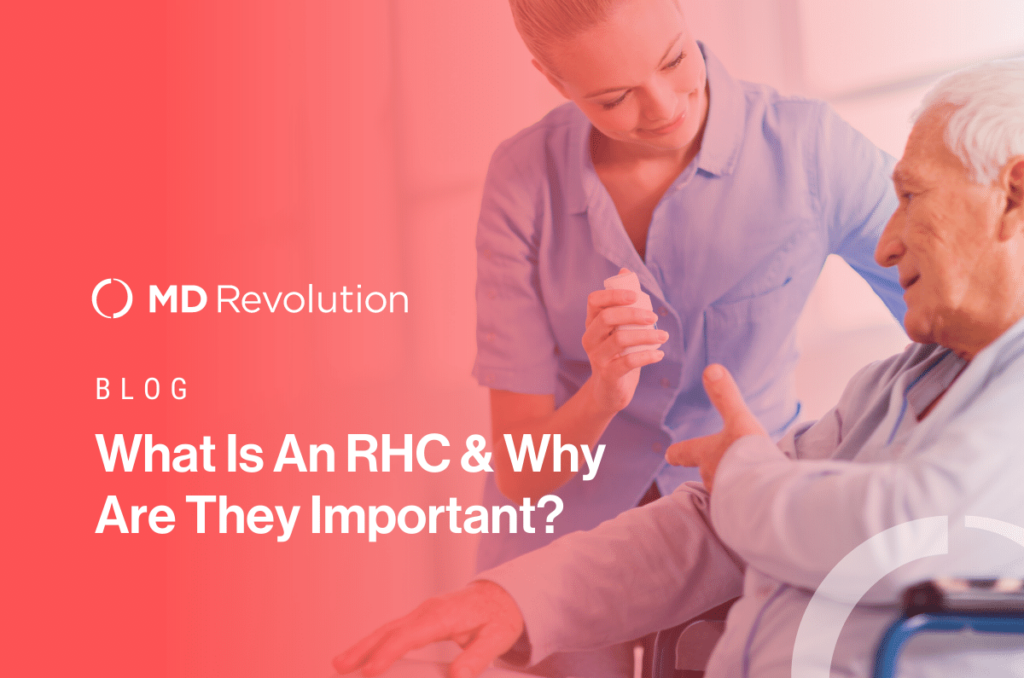This blog is brought to you by our partners at Azalea Health.
A rural health clinic (RHC) is a rurally located, CMS-designated medical clinic that provides outpatient primary care services to patients in underserved areas.
Established in 1977, the RHC program increases the utilization of mid-level practitioners to address the shortage of primary care in rural, underserved areas. RHCs go through a certification process through CMS in order to receive enhanced reimbursement for providing Medicare and Medicaid services.
Benefits of RHCs in Rural Communities
- Access to primary care that would otherwise be limited or non-existent
- Provides local basic emergency care and life-saving services
- Combats physician shortages by using mid-level providers
RHC Fast Facts
- There are over 4,500 RHCs nationally.
- RHCs can be designated as independent or provider-based (operated as an essential part of a hospital, nursing facility, or home health agency).
- Provider-based RHCs are classified as small or large based on the parent facility’s bed size (50 beds is the break point). Most provider-based RHCs are hospital owned.
- CMS lists RHCs publicly on the S&C QCOR website.
- RHCs are paid an All-Inclusive Rate (AIR), or a bundled payment per visit for qualified primary care and preventative health services.
- Although not required to do so, 86% of RHCs offer patients no-fee or sliding-fee schedule care.¹
What Are the Benefits of RHC Certification?
- Enhanced Medicare reimbursement – 25-75% increase in revenue²
- Cost-based reimbursement
- Visit fee is the same for physicians and mid-level providers
- Visit fee is the same regardless of E&M level
- Bad Medicare debt can be recouped
- Exempt from MACRA, however it may still be beneficial to submit
Enhanced Medicare reimbursement is the driving force behind a clinic seeking RHC certification. The U.S. Health Resources & Services Administration (HRSA) has stated that a clinic with a minimum 50% Medicare or Medicaid patient volume will see anywhere from a 25% to 75% increase in revenue.
A traditional medical practice is reimbursed based on Medicare’s Fee-For-Service (FFS) schedule. RHC reimbursement is based on a capped, flat fee per visit with a cost-based reconciliation done at the end of the year.
The end of the year cost report allows RHCs to be reimbursed for:
- Bad Medicare patient debt (at 65%),
- Some vaccine costs,
- lab costs, and
- the technical part of diagnostic test costs.
It is important to note that it may not be beneficial for all clinics to obtain RHC status as it depends on the clinic’s payer mix. Evaluating the financial feasibility of RHC status is critical in determining if a clinic should proceed with RHC certification. Beyond reimbursement, RHCs may experience other benefits such as operational efficiency utilizing mid-level providers and may be able to qualify for other federal or state programs.
What Are the Basic RHC Requirements?
Location
- Located in a federally defined non-urban area AND
- Located in a federally defined health professional shortage area or medically underserved area (in past 4 years)
Staffing
- Employ at least one nurse practitioner (NP), physician assistant (PA), certified nurse midwife (CNM) (additional staff can be contracted) AND
- Staff one NP, PA or CNM during 50% of operational hours
- Meet minimum annual productivity standards
- 4,200 visits per FTE physician
- 2,100 visits per FTE mid-level providers
Health Care Services Requirements
- Must perform all of the following on routine lab services on-site:
- Pregnancy testing
- Blood sugar testing
- Stick or tablet chemical urine examination or both
- Hemoglobin or hematocrit
- Occult blood stool specimen examination
- Primary culturing to send to a certified lab
- Emergency drugs and biologicals on-site
- Arrangement with hospital to provide supplemental medically necessary services
Other
- Post operation days and hours
- Maintain required policies, procedures, and patient records
- Conduct an annual quality assessment and improvement program
- Cannot be an FQHC or primarily a rehab or mental health facility
- Other federal and state requirements apply.
How To Become An RHC
Location Eligibility Verification
Determine if your clinic location is eligible for RHC status. Rural Health Information HUB provides an “Am I rural?” Tool, but ultimately you can verify with your state agency.
Feasibility Study
Before making an investment in becoming an RHC, a thorough financial analysis should be conducted to ensure that converting to an RHC is financially beneficial. An RHC consultant can help conduct the study. HRSA also makes a basic template available.
Request RHC application packet
Each state’s application packet varies. After completing the RHC application and provider enrollment, you will be notified if approved to continue the RHC process.
RHC Certification Survey (Inspection)
Once your clinic is in full compliance with RHC regulations, you can contact your state or one of the two CMS-approved RHC certification organizations. The RHC certification survey or inspection covers four key areas: policies and procedures, medical records, facility, and program evaluation. For details, reference Chapter 5: Preparing for the RHC Certification Inspection of HRSA’s “Starting a Rural Health Clinic – A How-To Manual”
Cost Report
Once assigned a Medicare number, a projected cost report is filed with Medicare to determine a preliminary per visit fee. The accuracy of this report is imperative as it has a significant impact on reimbursement. For a complete step-by-step guide, visit HRSA to view “Starting a Rural Health Clinic – A How-To Manual.”
How To Maintain RHC Compliance
Annual Cost Reporting
- Cost reports must be submitted within 5 months of the end of the clinic’s fiscal year.
- Clinics need a systematic procedure to track number of visits accurately per provider.
- It is advised to develop a system of checks and balances between scheduling and reporting to verify number of visits.
- Example: Pull a report in your EHR and PM software and compare the number of visits seen by provider vs NP to the data in the scheduler.
Up-to-Date Provider Credentialing
- Physician and mid-level providers are constantly recredentialed.
- Visit CMS/Medicaid site quarterly to check if a provider needs to be recredentialed. Notices are publicly posted.
Annual Program Evaluation
- RHCs are required to conduct an annual self-evaluation. RHC program evaluation is subject to review by certified surveyors for initial certification and compliance inspections.
- Surveyors will want to know the following questions were asked and any actions taken based on response.
- Were RHC services utilized appropriately?
- Did staff adhere to policies?
- Are any updates warranted?
Staff Education
- Educate staff on RHC policies, regulations, and history. Inspectors can speak with any staff member and expect them to be educated on all aspects of the RHC.
How To Prepare for RHC Inspections
Unscheduled inspections can occur as often as every 3 to 7 years.
- It is important for the front desk or first point of contact to be prepared in greeting and directing the surveyor to make a good first impression for the clinic.
- Surveyors will be reviewing policies, record keeping, physical clinic requirements, emergency preparedness and more.
- Policies and procedure topics include HR, administration, clinical protocol, and medical guidelines per RHC Code of Federal Regulations (CFR) §491.7(a)(2). HRSA provides a sample manual as a reference for new RHCs.
- Inspectors expect everything to be in a file or binder ready to be reviewed promptly.
Maintaining an RHC’s certification requires ongoing compliance and preparation efforts in order to pass inspection. RHC consultants help RHCs maintain policies and procedures, conduct annual quality evaluation and make improvement recommendations and plan.
Maintaining compliance is also critical for RHCs to be grandfathered into the RHC program if their location no longer qualifies as RHC eligible.
Survey (Inspection) Results
RHCs must be 100% compliant. If a deficiency is found, clinics have 10 calendar days to submit a Plan of Correction. Depending on the severity, RHCs have 45-60 days to be back in compliance.
What Happens If an RHC Loses Its Certification?
- Reimbursement reverts to fee-for-service model, impacting practice revenue
- Cannot reapply for RHC status for 5 years
- When a clinic reapplies, they restart the entire process which could take an additional 6-9 months.
Medicaid RHC Billing
Medicaid’s RHC reimbursement program varies by state. Federal regulations require states to recognize RHC services and minimum reimbursement guidelines exist. Medicaid’s reimbursement structure was federally established as a prospective payment system (PPS), but states were also given the opportunity to establish an alternative payment model (APM) if agreed to by RHCs. It is important to reach out to the state agency to understand state Medicaid RHC reimbursement structure.
RHC vs Federally Qualified Health Clinic (FQHC)
Often confused with or compared to FQHCs, the RHC program precedes the FQHC program by more than ten years. That said, there are more than twice as many FQHCs than there are RHCs. The popularity of FQHCs can be attributed to their higher reimbursements and less restrictive location policy.
Key FQHC differences include:
- Can be located in urban areas
- Stricter operational requirements such as hours open and services offered
- Required to treat patients of all ages
- Required to operate on a sliding fee schedule for patients
- Cannot be a for-profit facility
- Eligible to receive more federal grants
- FQHC per visit reimbursement is nearly $80 more compared to some RHCs
For a complete comparison, visit HRSA to view the Comparison Guide.
What Challenges Do RHCs Face?
Challenges and focus areas³ the industry has identified include:
- Reimbursement,
- Survey and Certification Process,
- Expanding telehealth use and reimbursement,
- Decreasing clinics’ regulatory burden, and
- Ensuring the RHC model/reimbursement is protected in the shift from FFS to value-based care.
To Learn About How Azalea Helps Rural Health Clinics visit our page here.
About MD Revolution + Azalea Health
As a strategic partner, MD Revolution’s Chronic Care Management (CCM) and Remote Patient Monitoring (RPM) solutions provide a seamless experience for the practice, fully integrated with Azalea’s electronic health records, revenue cycle management, data insights, and telehealth solutions designed for rural and community practices and hospitals. Quick to deploy and intuitive to use, our partnership ensures better care coordination and communication – enabling better outcomes and a meaningful competitive advantage. Learn more at https://mdrevolution.com/partner/azalea/
Sources:
- http://muskie.usm.maine.edu/Publications/rural/pb/RHC-Safety-Net.pdf
- https://www.hrsa.gov/sites/default/files/ruralhealth/pdf/rhcmanual1.pdf
- https://www.blubrry.com/rural_health_voice/41009192/rhv-9-rural-health-clinics/
- http://depts.washington.edu/uwconf/nwrhc2018/D4_Math_of_an_RHC.pdf
- https://cdn.zephyrcms.com/b8f91a30-3c07-4142-87e2-6683b8aa7bf8/-/inline/yes/hill-kate-strategies-for-ongoing-rhc-compliance.pdf
- AAAASF/RHC Standards and Checklists Manualhttps://www.aaaasf.org/docs/default…/standards-manual-and-checklist-v2-2-(rhc).pdf?…



